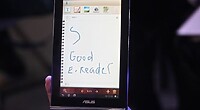
Melville House, an independent publishing house, has launched an initiative with one focus in mind: save the book stores.
According to Melville House, the best way to bring customers into a brick-and-mortar store is to give them quasi-interactive electronic content that they would not have on their own, at least not without intensive extraneous time Googling a lot of features that Melville is currently incorporating into their new product, Hybrid Books.
From the Melville House website:
“The HybridBook project is an innovative publishing program that takes the concept of the enhanced ebook and imposes it on print media.”
Each book in the HybridBook program features not only the core text of the novel, but extensive additional material rendered in digital form and called the Melville House Illuminations. The Illuminations consist of highly curated text, maps, photographs and illustrations related to the original book.
The Melville House Illuminations are free with the purchase of any title in the HybridBook series, no matter the format.
Purchasers of print copies of books in the HybridBook series can obtain the Illuminations for a given title simply by swiping the QR code found in the back of each book, or by following the url also given in the back of the print book.
Purchasers of the digital version receive the appropriate Illuminations automatically as part of the ebook edition they’ve purchased.”
In essence, a hybrid book allows the reader to download “illuminations” free of charge once a print edition of the book is purchased. The reactions across the internet, though, have been mildly mixed. While it is always great to have access to free material as a “thank you for your purchase,” some of the reactions have pointed out this content is not actually interactive. According to Scott Esposito’s blog, Conversational Reading, “this sounds like footnotes available via a QR code.” Of course, the hybrid book has essentially eliminated the digital book reading audience, but the focus of this project is to enhance existing print paperbacks. Other articles have pointed out that the free content doesn’t enhanced the reading experience, so much as provide third-party background information, unlike what users are anticipating from the ebook release of Rowling’s Harry Potter series in which the author herself will be providing her writing notes and unpublished back story.
When viewed from the perspective that free searchable content is delivered instantly with the purchase price of the print edition, this is a no-lose concept; the reader is at liberty to choose not to interact with the extra features of the hybrid book. More importantly, though, is the realization that someone in the publishing industry is finally taking steps to salvage the book stores by offering something that reading consumers can get within the walls. If it means the potential growth of reading and a halt on the death of bookstores, it can’t be all that bad.
Mercy Pilkington is a Senior Editor for Good e-Reader. She is also the CEO and founder of a hybrid publishing and consulting company.
